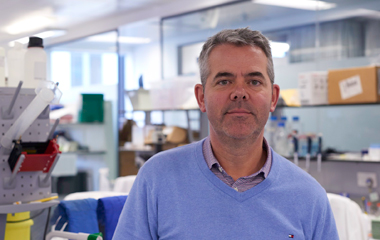Making radiotherapy more effective in glioblastoma
Fast facts
Official title: Combining the Akt inhibitor MK-2206 with radiation to improve outcomes for patients with glioblastoma
Lead: January 2018 – June 20192
Cost: This £49,000 grant is co-funded with Cancer Research UK for 18 months
Research type: Adult, Glioblastoma (High Grade), Pre-clinical trial
Award type: Pre-clinical trial, Co-funding with Cancer Research UK
What is it?
When radiotherapy is used to treat cancers it aims to damage DNA in the tumour cells so badly that the cells die. One theory of why glioblastomas are resistant to our current treatments is that the tumour cells can repair the damage to DNA faster than the ‘therapy’ can kill them.
A protein called Akt within the tumour cells is responsible for the increased DNA repair. Blocking Akt activity using a drug called MK-2206 makes tumour cells more vulnerable to radiation.
Professor Chalmers and his team will test MK-2206 with radiation therapy, with chemotherapy (temozolomide, TMZ), or radiation therapy plus TMZ. Response to these three treatment combinations will be measured in glioblastoma tumour cells, as well as tumour models.
Why is it important?
Glioblastoma is the most common malignant primary tumour occurring in adults and affects 2,200 individuals in England, annually. Glioblastomas have extremely poor survival rates, with only 5% of patients surviving 5 years beyond diagnosis. The dismal prognosis is because of the tumour’s resistance to treatments. That’s why it’s so important to research new ways to treat glioblastomas.
Who will it help?
This study has the potential for real impact to people diagnosed with a glioblastoma in the near future. If the outcome of this pre-clinical trial are positive, the researchers will move straight into designing a clinical trial for people newly diagnosed with a glioblastoma using this Akt inhibitor drug. WE hope this will mean that radiotherapy is more effective and that survival will be increased.
Milestones
- Identify a positive effect of MK-2206 in at least 3 cell lines, or in cells with a certain characteristic (MGMT methylation).
- Selection of the best model to continue the work based on the data from Milestone 1.
- Identification of a biomarker that could predict if the drug will work in an individual tumour.
- Understand how the drug is working by seeing what it does within the tumour.
- Assess if any tested combination has a significant “symptom-free survival” effect when MK-2206 is added to ‘standard of care’ treatment.
If you have any questions about this, or any of our other research projects, please contact us on [email protected]
Research is just one other way your regular gift can make a difference
Research is the only way we will discover kinder, more effective treatments and, ultimately, stamp out brain tumours – for good! However, brain tumours are complex and research in to them takes a great deal of time and money.
Across the UK, over 100,000 families are facing the overwhelming diagnosis of a brain tumour and it is only through the generosity of people like you can we continue to help them.
But, by setting up a regular gift – as little as £2 per month – you can ensure that families no longer face this destructive disease.
In this section

Professor Chalmers is Chair of Clinical Oncology at the University of Glasgow. His main research interest is in improving outcomes for patients with glioblastoma by combining radiotherapy with targeted drug therapy.